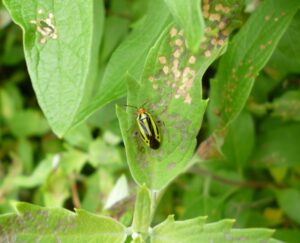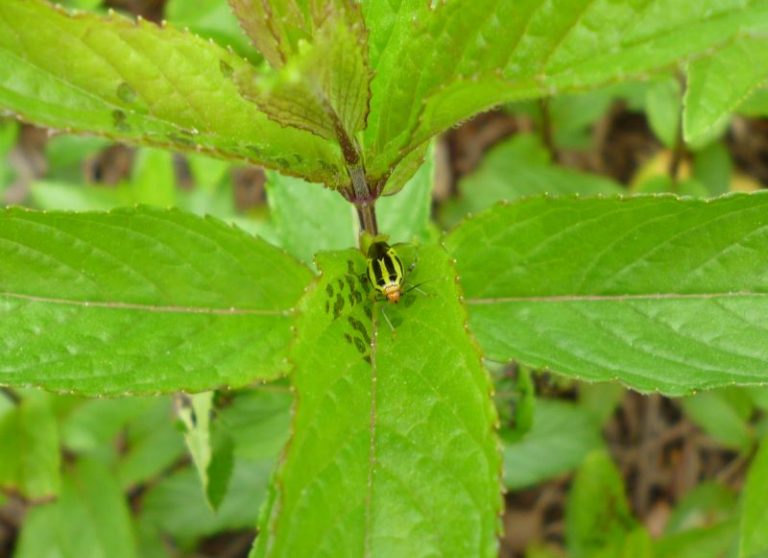Fourlined Plant Bug (Poecilocapus lineatus)
GDD Window (base 50): 90-1500
Overview:
- Eggs overwinter in tender shoots and plant debris
- Nymphs hatch as small adults with black and yellow striped wing pads and begin feeding on succulent plant tissues by late-May
- Adults are small (3/16″) and yellow with four stripes down their backs
- Adults will typically be found in the canopies of susceptible plants
- Feed by sucking plant sap, resulting in clusters of brown to black round spots that are sunken in on the leaves
- The spots can grow and merge to distort or damage entire leaves, and may turn translucent or become holes
- Heavy feeding on new growth can cause the plant to wilt
- Feeding stops by late-June and most plants will outgrow any damage
- Host plants: over 250 species of herbaceous and small woody ornamental plants
Management:
Cultural Practices:
- Natural predators: birds, frogs, spiders, predatory wasps and larvae, jumping spiders, big-eyed bugs, damsel bugs, pirate bugs
- Sweep net sampling is best for scouting
- Prune infested leaves and remove debris
- Reduce plant stress
- Remove overwintering eggs
- Cut back growth in the fall
Materials:
- Contact insecticides:
- Pyrethroids [3]: –thrins
- Carbamates [1A]: Carbaryl
- Organophosphates [1B]: malathion
- Systemic insecticides:
- Neonicotinoids [4A]: acetamiprid
- Considerations:
- Will harm non-target species
- Timing of treatment is essential
Biorationals:
- Insecticidal soap
- Horticultural oils



Disclaimer – Materials do not cover all possible control scenarios and are intended for licensed professionals. Tradenames do not imply endorsement and are used as examples. You must strictly follow the label for each compound prior to use. Rutgers is not responsible form is used materials or damages thereof. The label is the law. Labels will provide detailed information on use and restrictions. Additionally, application intervals, compatibility, surfactant use, PHI, PPE, important and other key information is described in detail. Always discuss treatments with your local agents. Note: Neonicotinoids can only be legally applied in commercial agriculture settings by licensed applicators. Guidelines and recommendations made in this presentation are specific to the state of New Jersey.
